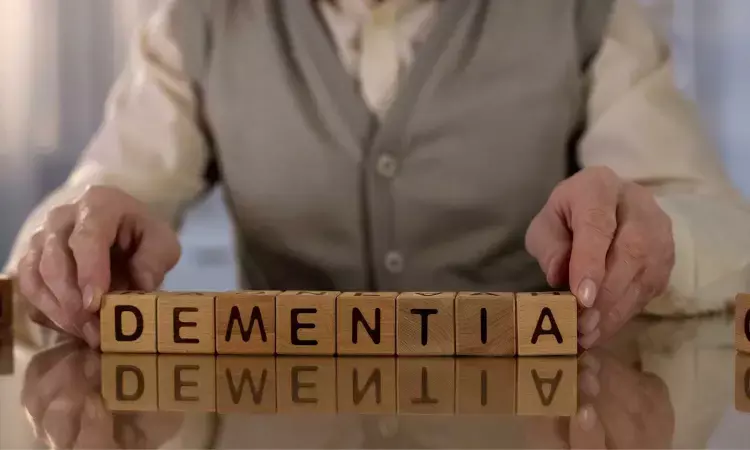- Home
- Medical news & Guidelines
- Anesthesiology
- Cardiology and CTVS
- Critical Care
- Dentistry
- Dermatology
- Diabetes and Endocrinology
- ENT
- Gastroenterology
- Medicine
- Nephrology
- Neurology
- Obstretics-Gynaecology
- Oncology
- Ophthalmology
- Orthopaedics
- Pediatrics-Neonatology
- Psychiatry
- Pulmonology
- Radiology
- Surgery
- Urology
- Laboratory Medicine
- Diet
- Nursing
- Paramedical
- Physiotherapy
- Health news
- Fact Check
- Bone Health Fact Check
- Brain Health Fact Check
- Cancer Related Fact Check
- Child Care Fact Check
- Dental and oral health fact check
- Diabetes and metabolic health fact check
- Diet and Nutrition Fact Check
- Eye and ENT Care Fact Check
- Fitness fact check
- Gut health fact check
- Heart health fact check
- Kidney health fact check
- Medical education fact check
- Men's health fact check
- Respiratory fact check
- Skin and hair care fact check
- Vaccine and Immunization fact check
- Women's health fact check
- AYUSH
- State News
- Andaman and Nicobar Islands
- Andhra Pradesh
- Arunachal Pradesh
- Assam
- Bihar
- Chandigarh
- Chattisgarh
- Dadra and Nagar Haveli
- Daman and Diu
- Delhi
- Goa
- Gujarat
- Haryana
- Himachal Pradesh
- Jammu & Kashmir
- Jharkhand
- Karnataka
- Kerala
- Ladakh
- Lakshadweep
- Madhya Pradesh
- Maharashtra
- Manipur
- Meghalaya
- Mizoram
- Nagaland
- Odisha
- Puducherry
- Punjab
- Rajasthan
- Sikkim
- Tamil Nadu
- Telangana
- Tripura
- Uttar Pradesh
- Uttrakhand
- West Bengal
- Medical Education
- Industry
Traumatic brain injuries in older adults linked to increased risk of dementia: Study

Traumatic brain injuries (TBI) in older adults are associated with new cases of dementia, use of home care services, and admission to long-term care, according to new research published in CMAJ (Canadian Medical Association Journal).
“One of the most common reasons for TBI in older adulthood is sustaining a fall, which is often preventable,” write Dr. Yu Qing Huang, ICES PhD student, and Dr. Jennifer Watt, associate professor and ICES scientist, both geriatricians at St. Michael’s Hospital, Unity Health, and affiliated with the University of Toronto, along with their coauthors. “By targeting fall-related TBIs, we can potentially reduce TBI-associated dementia in this population.”
Traumatic brain injuries are caused by a direct impact to the head or indirect force (e.g., whiplash) with one of the following: loss of consciousness, posttraumatic amnesia, disorientation, or neurological signs like slurred speech, muscle weakness, or vision changes. More than 50% of TBIs in older adults result from falls, and 1 million people in Canada over age 65 will experience a TBI in their lifetime.
To understand the impact of late-life TBI and the association with new cases of dementia and related care needs, researchers analyzed data on more than 260 000 adults aged 65 years or older with and without TBI between April 2004 and March 2020. The study followed participants until a diagnosis of dementia, to March 2021, or death. New TBI was associated with a 69% increased risk of subsequent dementia in the first 5 years, a 56% increased risk beyond 5 years, and more days of publicly funded home care (87 days compared with 84 days in people without TBI).
Age and female sex were associated with higher risk of dementia, with about 1 in 3 people aged 85 years and older predicted to develop dementia after TBI. Income was also linked to dementia risk, with people from low-income neighbourhoods at higher risk of dementia than those in high-income neighbourhoods. People living in smaller communities, low-income regions, and areas with less ethnic diversity were more likely to be admitted to a long-term care facility.
“Our findings suggest that, to better align limited health resources with population needs, specialized programs such as community-based dementia prevention programs, and support services should be prioritized for female older adults (≥ 75) living in smaller communities and low-income and low-diversity areas.”
The authors intend for these results to help clinicians and families navigate the effects of a TBI.
“Although TBI has been studied as a risk factor for dementia in adulthood, our findings emphasize its significant association with an increased rate of incident dementia, even when it is sustained in late life, and how this risk changes over time,” write the authors. “This critical information can assist clinicians in guiding older patients and their families to better understand long-term risks.”
Reference:
Yu Qing Huang, Manav V. Vyas, Susan E. Bronskill, Zhiyin Li, Jun Guan, Peter M. Hoang, Alan Tam, Mark Bayley, Corita Vincent, Sharon E. Straus and Jennifer A. Watt, Rate of incident dementia and care needs among older adults with new traumatic brain injury: a population-based cohort study, Canadian Medical Association Journal, DOI: https://doi.org/10.1503/cmaj.250361.
Dr Kamal Kant Kohli-MBBS, DTCD- a chest specialist with more than 30 years of practice and a flair for writing clinical articles, Dr Kamal Kant Kohli joined Medical Dialogues as a Chief Editor of Medical News. Besides writing articles, as an editor, he proofreads and verifies all the medical content published on Medical Dialogues including those coming from journals, studies,medical conferences,guidelines etc. Email: drkohli@medicaldialogues.in. Contact no. 011-43720751


